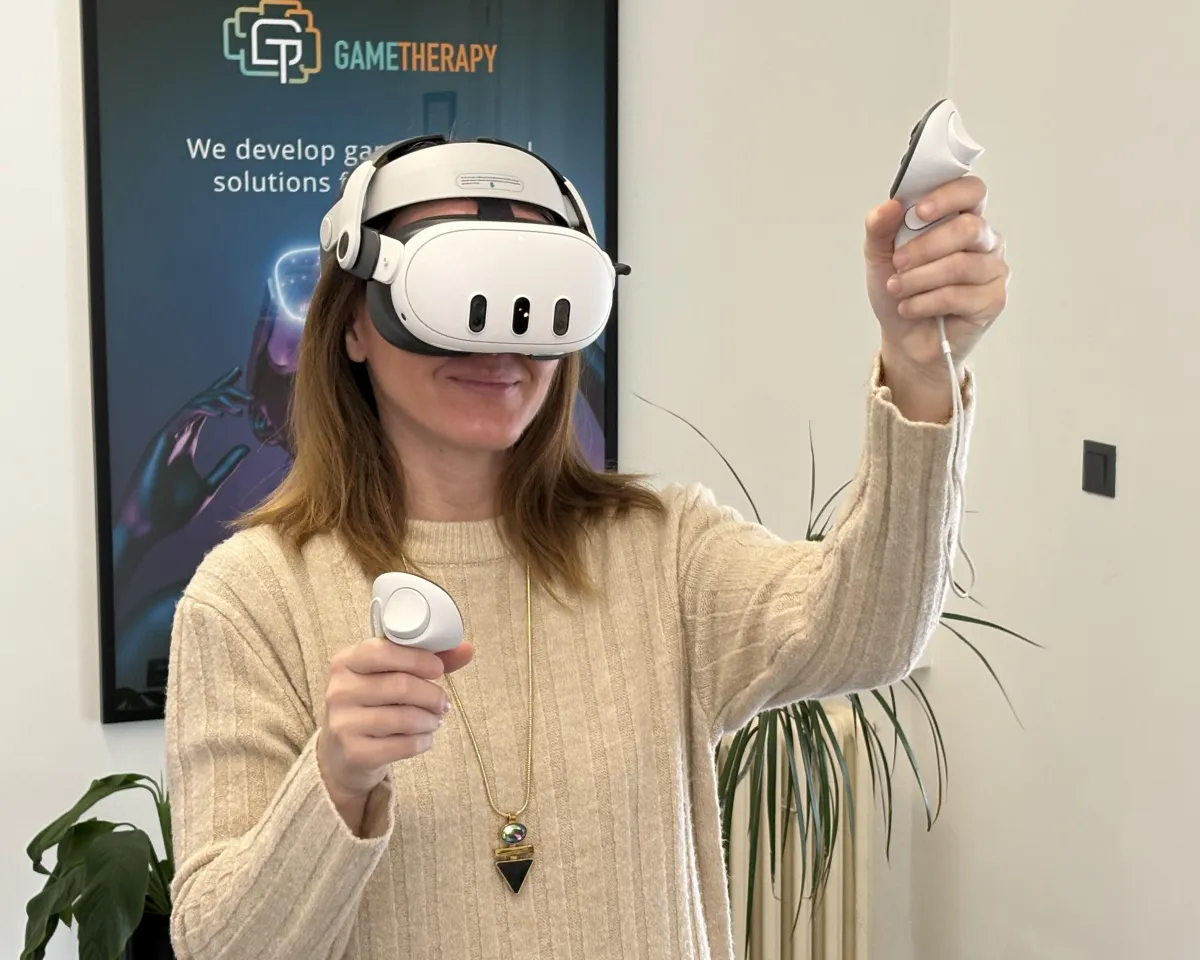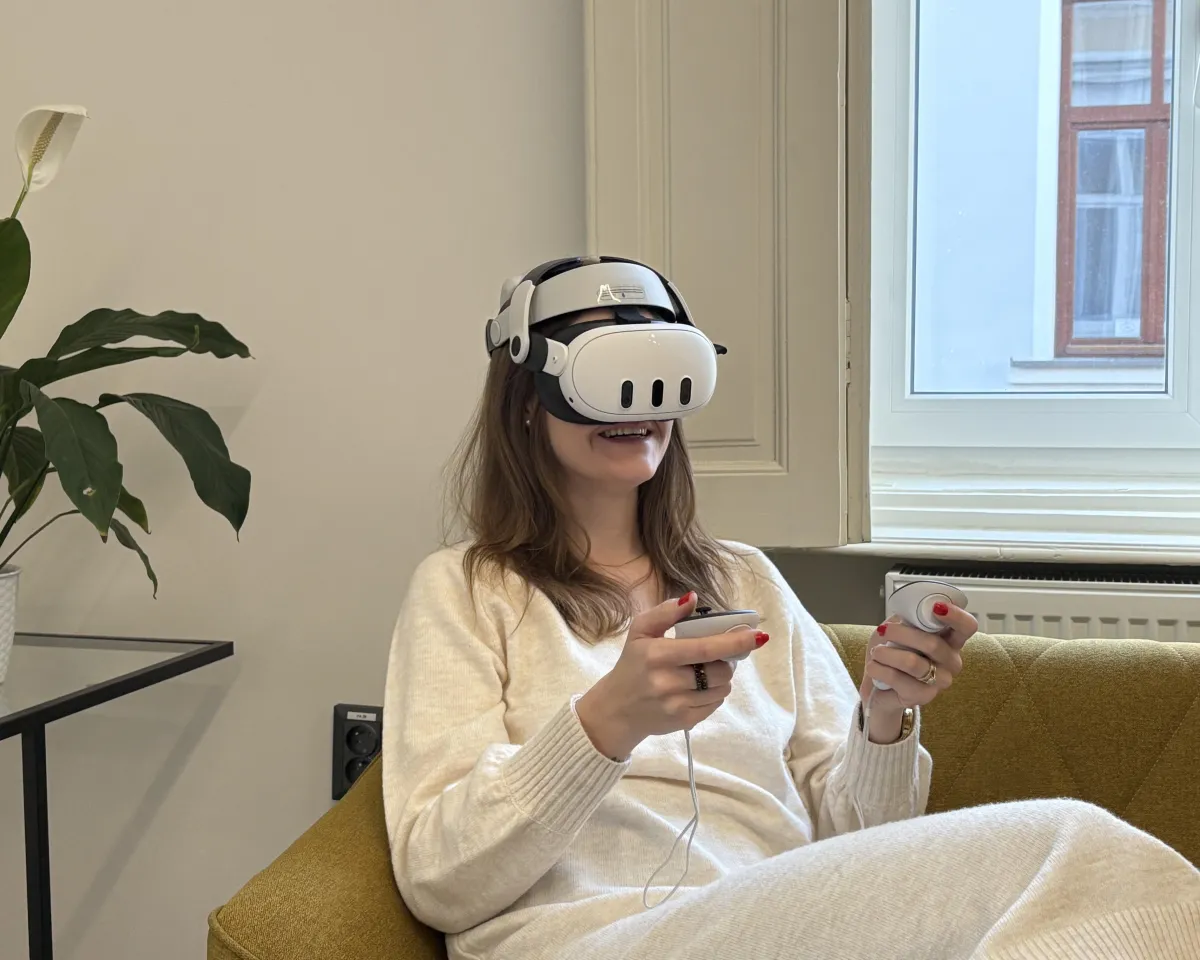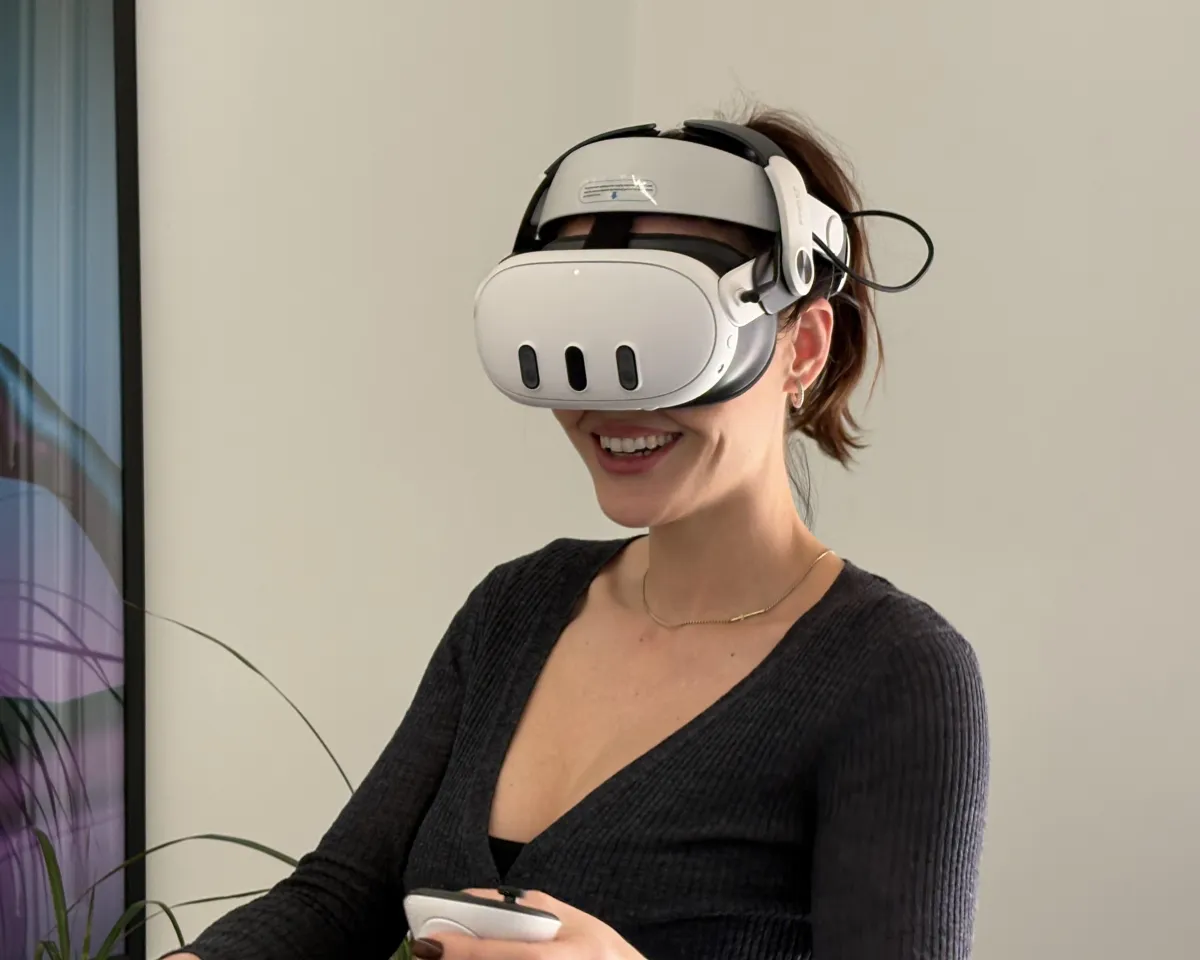BRIDGING RESEARCH, TECHNOLOGY, AND THE GAMING WORLD
Your partner in cutting-edge software development
Our mission is to transform human well-being and human-computer interaction. We do this by integrating virtual reality, augmented reality, and artificial intelligence technologies. At the heart of our philosophy is game-therapy. We create innovative, scientifically grounded, yet playful solutions for a wide range of challenges.

IMPACTFUL TOOLS FOR A BETTER QUALITY OF LIFE
Our products
ClaustrOFF
A game created with cutting-edge research to help you overcome fears in a safe, engaging, and effective way
NeuroBoostVR
Innovative exercises for seniors and others to improve motor skills, balance, and orientation with simple, effective activities
VIRADIA
Virtual Reality Platform for Early Diagnosis of Neurodegenerative Diseases, Revolutionizing Neurological Diagnostics
Experience the full power of VR for positive well-being
With a commitment to innovation and the transformative power of VR, we aim to make a lasting impact on mental health, education, industry, and personal growth, all grounded in scientific research and designed to enhance well-being worldwide.

GROWTH THROUGH INNOVATIONS
The GAMETHERAPY model
We harness the power of new technologies. By making care and training more accessible and tailored, we empower individuals and organizations to thrive. Rooted in scientific research, our innovative approach drives meaningful change, transforming mental health, education, healthcare, industry, and personal growth on a global scale.
SOLUTIONS THAT MAKE AN IMPACT
Immersive solutions for mental health and beyond
Our primary focus is on creating immersive applications that empower individuals to overcome challenges like anxiety, phobias, and neurological conditions. These solutions are designed to enhance well-being and unlock potential across various aspects of life, showcasing our expertise in innovative and impactful technologies.
Engaging VR/AR solutions for soft skills training
Evaluation in neurology and rehabilitation
General education
Personal development
Industrial training
Industry 5.0 applications

Join the Mind Heaven Community!
Be part of our journey to transform mental health care and well-being through innovation and gamification. By signing up, you’ll gain access to exclusive psychological content, enjoy discounts on our products, and stay updated with the latest news about our projects. You’ll also discover unique content like game stories and behind-the-scenes insights into our app development process. We value your ideas and feedback to make our games even better. Join us, become a co-creator, and help shape the future of the Mind Heaven Community!

How to Overcome Social Anxiety with Cognitive Behavioral Therapy
How to Overcome Social Anxiety with Cognitive Behavioral Therapy

"Social anxiety doesn’t define who you are - it’s a challenge, not a limitation. CBT offers the tools to help you face this challenge and thrive." – Dr. Martin Polák
Social anxiety can make everyday interactions feel overwhelming, whether it’s speaking up in a meeting, attending a social gathering, or even making eye contact. But there’s hope. Cognitive Behavioral Therapy (CBT) is a proven, science-backed approach that helps people manage and overcome social anxiety by addressing the thoughts and behaviors that fuel it. In this guide, we’ll explore how CBT works, its key strategies, and how you can apply them to build confidence and feel more at ease in social situations.
What is Social Anxiety?
Social anxiety, also known as social phobia, is the intense fear of being judged, embarrassed, or humiliated in social settings. It’s one of the most common anxiety disorders, affecting nearly 7% of people worldwide. Symptoms include:
Avoiding social interactions.
Excessive worry about upcoming events.
Physical symptoms like sweating, blushing, trembling, or a racing heart.
Left unaddressed, social anxiety can impact relationships, work, and overall quality of life. That’s where CBT comes in.
How CBT Helps with Social Anxiety
CBT focuses on identifying and changing unhelpful thought patterns and behaviors. It’s considered the gold standard treatment for social anxiety because it:
Addresses Negative Thoughts: CBT helps you recognize and challenge irrational beliefs about yourself or how others perceive you.
Promotes Gradual Exposure: By facing feared situations in a controlled way, CBT helps reduce avoidance and build confidence.
Teaches Coping Skills: CBT equips you with tools like relaxation techniques and problem-solving strategies to manage anxiety.
Research published in the Journal of Anxiety Disorders shows that CBT is effective for up to 75% of people with social anxiety, offering lasting benefits.
Key CBT Strategies to Overcome Social Anxiety
1. Identifying and Challenging Negative Thoughts
Social anxiety often involves unhelpful thoughts like:
"Everyone is judging me."
"I’ll say something stupid."
CBT Technique: Cognitive restructuring helps you question these thoughts and replace them with more balanced, realistic ones.
Example: Instead of thinking, "I’ll embarrass myself," try reframing it to, "Even if I make a small mistake, people are unlikely to notice or care."
2. Exposure Therapy
Avoidance reinforces social anxiety, but gradual exposure to feared situations can help you overcome it.
How it works: Start with less intimidating scenarios, like saying hello to a neighbor, and gradually work toward bigger challenges, such as giving a presentation.
Why it helps: Each exposure teaches your brain that social situations aren’t as dangerous as they seem.
3. Behavioral Experiments
Behavioral experiments test the accuracy of your anxious thoughts.
Example: If you believe people will mock you for saying something wrong, intentionally make a small mistake in conversation and observe their reactions.
Outcome: You’ll likely find that others are more understanding and less judgmental than you expect.
4. Relaxation and Mindfulness Techniques
Anxiety often triggers physical symptoms that make social situations harder.
CBT Techniques: Deep breathing, progressive muscle relaxation, and mindfulness can help you stay grounded and calm.
Practical Tip: Before entering a social event, take a few deep breaths, inhaling for 4 seconds, holding for 4 seconds, and exhaling for 6 seconds.
5. Building a Fear Hierarchy
A fear hierarchy organizes your fears from least to most intimidating, helping you tackle them step by step.
Example: Start with small goals like making eye contact, then progress to initiating conversations or speaking in front of a group.
Why it works: Gradual progress builds confidence and reduces the fear of failure.
Practical Tips to Make CBT More Effective
Be Consistent: Practice CBT techniques regularly to see lasting results.
Track Your Progress: Keep a journal to record your thoughts, exposures, and achievements.
Seek Support: Working with a trained CBT therapist can provide personalized guidance.
Celebrate Small Wins: Acknowledge every step you take, no matter how small—it’s all progress.
CBT vs. Other Treatments for Social Anxiety
While medications like SSRIs can help reduce symptoms, CBT addresses the root causes of social anxiety, offering long-term benefits. A 2022 meta-analysis in The Lancet Psychiatry confirmed that CBT outperforms medication alone for sustained improvement in social anxiety symptoms.
The Science Speaks
Research highlights the effectiveness of CBT for social anxiety:
Journal of Clinical Psychology (2021): Found that cognitive restructuring and exposure therapy reduce avoidance behaviors and improve social confidence.
Behavior Research and Therapy (2022): Demonstrated that CBT’s effects are long-lasting, with benefits still present years after treatment.
The American Journal of Psychiatry (2023): Concluded that combining CBT with mindfulness techniques enhances outcomes for people with social anxiety.
Final Thoughts
Social anxiety doesn’t have to control your life. By understanding your thoughts, facing your fears, and learning practical skills through Cognitive Behavioral Therapy, you can build confidence and embrace social situations with greater ease. Whether you work with a therapist or practice these strategies on your own, every step forward is a victory. Remember, change takes time, but with consistent effort, overcoming social anxiety is entirely possible.
References
Clark, D. M., & Wells, A. (2021). Cognitive therapy for social anxiety disorder: Current status and future directions. Journal of Anxiety Disorders.
Hofmann, S. G., & Smits, J. A. J. (2020). Cognitive-behavioral therapy for anxiety disorders: An update. Psychiatric Clinics of North America.
Moscovitch, D. A., et al. (2023). Behavioral experiments in the treatment of social anxiety. Behavior Research and Therapy.
Rodebaugh, T. L., et al. (2022). The effectiveness of CBT for social anxiety disorder: A systematic review. Clinical Psychology Review.






